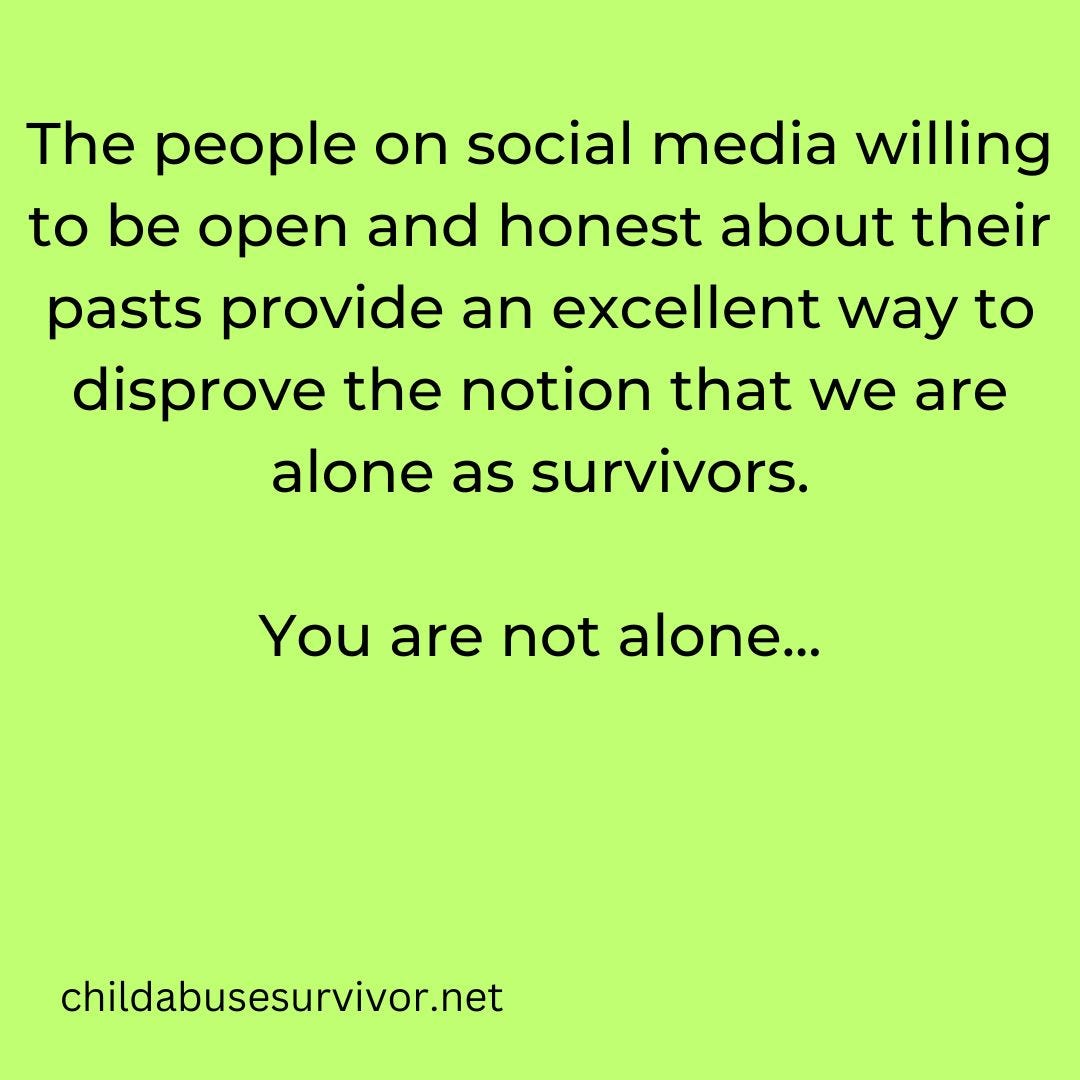Thank you for reading the Child Abuse and Mental Health Survivors newsletter. Each week I share new blog posts and other resources that aim to help survivors of childhood abuse and those who are struggling with mental health issues feel less alone as we discuss the issues surrounding our issues. If you’ve tried to follow the resources I share on social media and find that the algorithm has decided for you to not show you the things we post, this is the best way to get caught up each week.
For more information about me and why this newsletter exists visit the website - Child Abuse Survivor.
The people on social media willing to be open and honest about their pasts provide an excellent way to disprove the notion that we are alone as survivors.
You are not alone...
Just a reminder before we get in to this week’s links and resources. Feel free to share this with anyone else who needs to be reminded.
New From the Blogs
It's Amazing What You Get Used To
When Nedra talks about growing up in an alcoholic family, naturally that was something that resonated with me. Growing up my father was an alcoholic. It was normal for me to fear your father, especially when they'd been drinking. It was normal for there to be violence at home. It was normal for children to be physically attacked for as little as making too much noise.
Perhaps worst of all, it was also normal to keep it all secret, to not share what happens at home outside of the immediate family.
Which made it all the more easy for the sexual abuse I suffered later to be kept secret.
If you're not familiar with what it can be like to try and get the proper mental health care in the US you should read this story. However, as you do read it, I need you to understand that this story, as hard as it is, actually represents the better side of the Mental Healthcare system. Ash's parents have some financial means and expertise to help them navigate the system, even if her Mom had to leave her job. Now imagine what this looks like for someone without those things.
Shared From Elsewhere
How to Manage When a Partner or Spouse Has Depression - It’s easy to forget that they need support too.
James Pennebaker, a psychologist at the University of Texas at Austin, has studied how writing about emotional upheavals in our lives can improve physical and mental health. Pennebaker found that “One of the brain’s functions is to help us understand events in our lives. Writing helps construct a narrative to contextualize trauma and organize ideas.”
Things worth knowing:
From the Archives
What Does Self Care Look Like For You?
But, I want you all to remember that “self care” is a two word phrase. Caring for your “self”, may not look the same as caring for my “self”. Hiking in the desert might sound like an absolutely horrible thing to you. Going skiing sounds like an absolutely horrible thing to me, but I know lots of people who love it. Good for them. Whatever form self care takes for you, go for it. If you don’t like traveling, but love reading, grab a novel and curl up on the couch. Go for a walk during your lunch hour, have a glass of wine before bed. There’s no absolute right or wrong way to care for ourselves. It involves doing the things that we enjoy, and are good for us. It’s doing the things that bring us peace and contentment, that bring even just a few moments of joy to our otherwise stressful and hectic life.
Learn how to be There - I shared this training last year, and was happy to see it is still available - https://betherecertificate.org/
“Half of life is just showing up. I didn’t do THAT much or go very much out of my way to help, but I showed up and helped, which is more than a lot of people do.”
Thanks for reading. If you find this newsletter informative and helpful to you, spread the word. That’s the best way you can say thank you for the effort I put in each week.



